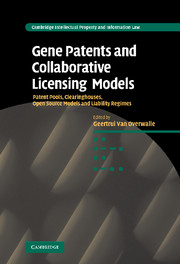 Gene Patents and Collaborative Licensing Models
Gene Patents and Collaborative Licensing Models Book contents
- Frontmatter
- Contents
- List of contributors
- Preface
- Foreword: Jean-Jacques Cassiman
- List of abbreviations
- Part I Patent pools
- Part II Clearinghouses
- Part III Open source models
- 12 Open source genetics. Conceptual framework
- 13 Case 8. CAMBIA's Biological Open Source Initiative (BiOS)
- 14 Case 9. Diversity Arrays Technology Pty Ltd. (DArT) Applying the open source philosophy in agriculture
- 15 Critical commentary on ‘open source’ in the life sciences
- 16 Several kinds of ‘should’. The ethics of open source in life sciences innovation
- Part IV Liability regimes
- Part V Different perspectives
- Part VI Summary and concluding analysis
- Index
- Titles in the series
13 - Case 8. CAMBIA's Biological Open Source Initiative (BiOS)
from Part III - Open source models
Published online by Cambridge University Press: 14 January 2010
- Frontmatter
- Contents
- List of contributors
- Preface
- Foreword: Jean-Jacques Cassiman
- List of abbreviations
- Part I Patent pools
- Part II Clearinghouses
- Part III Open source models
- 12 Open source genetics. Conceptual framework
- 13 Case 8. CAMBIA's Biological Open Source Initiative (BiOS)
- 14 Case 9. Diversity Arrays Technology Pty Ltd. (DArT) Applying the open source philosophy in agriculture
- 15 Critical commentary on ‘open source’ in the life sciences
- 16 Several kinds of ‘should’. The ethics of open source in life sciences innovation
- Part IV Liability regimes
- Part V Different perspectives
- Part VI Summary and concluding analysis
- Index
- Titles in the series
Summary
Introduction
CAMBIA is a private non-profit research institute unique in its kind. Located in Canberra, Australia, CAMBIA is not only developing new life science technologies, but also pioneering new business models driven by its mission to increase fair access to the tools of innovation as a fundamental human right. Founded by molecular biologist and social entrepreneur Richard Jefferson about fifteen years ago, CAMBIA has been applying new practices both in life sciences and IP management to foster innovation and collaboration throughout the developed and developing world.
The reason behind this mission is at least two-fold: humanitarian and economical. The crushing reality that the world is faced with an estimated four billion people living in extreme poverty, hints to structural problems at many levels. CAMBIA advocates sustainable and equitable development through active participation of developing countries so that their needs can be addressed. A prerequisite is that the working tools are made available and accessible to all.
Access to these tools in the field of life sciences seems to be increasingly hampered by high levels of patenting, broad scope of patents and restrictive licensing. All players in the field of innovation appear to be affected. Even purely academic scientists experience the effect of licensing on new techniques and might not be immune from patent infringement, although this has yet to emerge as a significant impediment to their activities. Moreover, concern is raised that inventions from publicly funded research projects are increasingly being acquired by private companies or licensed exclusively.
- Type
- Chapter
- Information
- Gene Patents and Collaborative Licensing ModelsPatent Pools, Clearinghouses, Open Source Models and Liability Regimes, pp. 194 - 203Publisher: Cambridge University PressPrint publication year: 2009
- 2
- Cited by


